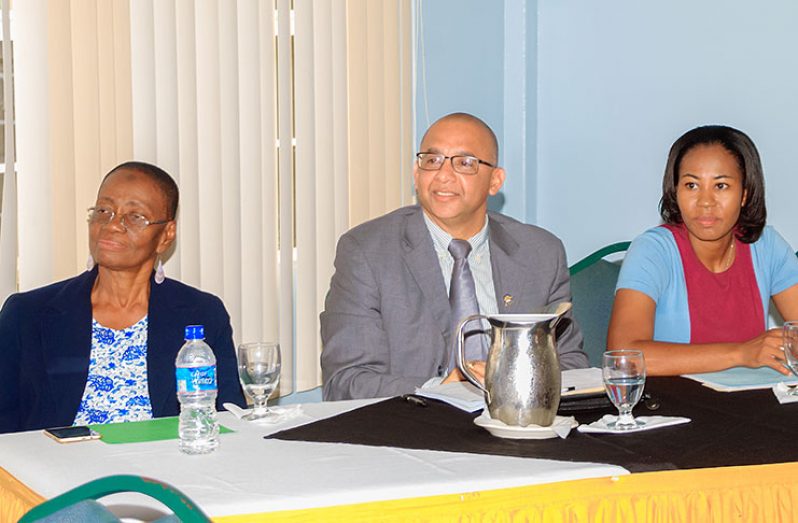…to cope with growing number of chronic diseases, accidents
THE growing number of chronic diseases and injuries from domestic and motor vehicular accidents has resulted in the need for Guyana’s disability and rehabilitation services to be strengthened and expanded, Director of Disability and Rehabilitation Services Ariane Mangar has said.
Mangar was at the time delivering remarks during the 4th Annual Meeting of CARICOM and Dutch Caribbean CBR Conference at the Grand Coastal Hotel on Monday. “Recent epidemiological trends in Guyana indicate a growing number of chronic diseases, and injuries from domestic and motor vehicular accidents. These trends signal a pattern of marked increases in the number of disabilities and related problems impacting on the family, community, and the country,” she explained, while adding that failure to provide the required services will only result in an enormous social and economic burden.
Although the country has made significant achievements in providing disability and rehabilitation services, Mangar said the current trend has created the need for these services to be enhanced.
Community Based Rehabilitation (CBR), she said, offers a viable option to bridge the gaps and strengthen the continuum of rehabilitation interventions across different social sectors.
This is the first time the Community Based Rehabilitation (CBR) Regional Conference is being held here in Guyana. It was organized by the Public Health Ministry’s Disability and Rehabilitation Services, in collaboration with the Caribbean CBR Network.
CBR was initiated by the World Health Organisation (WHO) in 1978, following the Declaration of Alma-Ata in an effort to improve the quality of life for persons with disabilities. Since then, it has grown to become a multi-sectoral approach working to improve the equalization of opportunities and social inclusion of people with disabilities, while tackling the issues of poverty and disability.
Mangar said in Guyana CBR was introduced via a small pilot project in 1986 which was being executed by Brian O’Toole and Geraldine Maison-Halls some 31 years ago.
Initially, the project was designed to increase rehabilitation coverage across the country by training volunteers, parents, members and caregivers, but CBR has evolved tremendously since then.
“The early 1990s saw a decline in the level of rehabilitation service delivery and this was due in the main to the high rate of attrition of both physiotherapists and assistants…However, the latter part of the 1990s saw a gradual improvement of the rehabilitation services with the introduction of a new cadre of mid-level rehabilitation personnel – rehabilitation assistants,” the Director of Disability and Rehabilitation Services pointed out.
It was noted too that assistant-level rehabilitation workers were trained in basic technologies in physiotherapy, occupational therapy and speech therapy, as a strategy to increase the number of workers to meet the needs of those living with disabilities.
This move had resulted in the expansion of services to Regions One, Five, Seven and Nine.
“The year 2012 saw a major breakthrough in the rehabilitation programme, as disability and rehabilitation services became available and accessible in all 10 of the administrative regions of Guyana, as Region Eight became the last region to introduce rehabilitation services with the placement of rehabilitation assistants at the Mahdia Hospital,” the director further pointed out.
Today, another cadre of rehabilitation workers called audiological practitioners provides basic audiological interventions in Georgetown and other parts of the country.
Meanwhile, the World Health Organisation (WHO) Health Services and Systems Advisor Paul Edwards, underscored the importance of providing equitable and quality services to persons living with disability in keeping with the country’s Health Vision 2020.
“We need to ensure that whatever financial support is made to this programme is spent and well spent,” he added, while noting some countries would have had challenges in spending money provided. WHO, he said, will continue to assist where necessary.
Geraldine Maison-Halls, Coordinator of the Rehabilitation Assistant Training Programme; Vice-Chairman of the Guyana CBR Programme, Lloyd Griffith; Chairman of the Guyana Council of Organisations of Persons with Disabilities, Leon Walcott; Dr. Glenville Liburd, Chairman of the Steering Committee for the Caribbean CBR Network and the National Insurance Scheme (NIS) Physiotherapist, Isha Urling, were among the officials present.
Catherine Sykes and Janice Jackson were among the facilitators that presented on Monday and will continue to present during the three-day forum.














